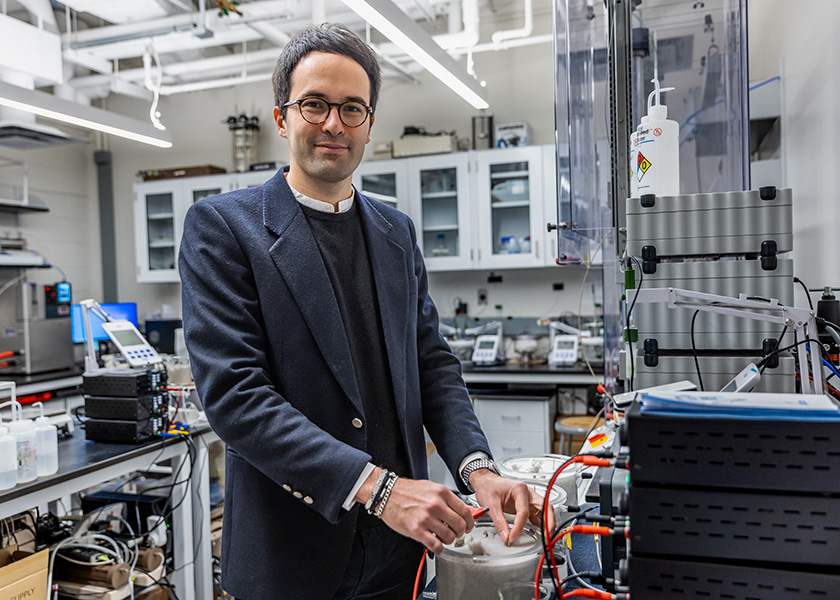Opportunities Underground
Alessandro Rotta Loria’s research explores opportunities and innovations in the subsurface

Italian poet Dante Alighieri’s views of the subsurface were far from uplifting. In his treasured 14th century epic, the Divine Comedy, Dante characterized the subsurface as a remote place, dirty, dark, and devoid of any good.
Some seven centuries later, his countryman, Northwestern Engineering assistant professor of civil and environmental engineering Alessandro Rotta Loria, offers a different perspective than Dante’s unflattering view of the subsurface – one that is laced with optimism and hope. The subsurface, Rotta Loria contends, presents opportunities for development and more sustainable living. It can provide energy, resources, storage, and shelter, all enticing prospects amid a rapidly changing climate and intensifying calls for renewable energy.
“There are literally opportunities and innovations lying right under our feet,” said Rotta Loria, who joined the McCormick School of Engineering in 2019.
At his Mechanics and Energy Lab, Rotta Loria and the team investigate the mechanics of geological and granular materials to better understand how changes in environmental conditions impact the capability of such materials to sustain mechanical pressures, allow fluid permeation, and transfer heat. The lab’s work holds applications for renewable energy production and storage, construction, manufacturing, and environmental conservation.
“We aim to improve quality of life in innovative ways and through a resource – the underground – that has often remained overlooked,” Rotta Loria said.

In one project, Rotta Loria and his team have installed more than 150 temperature sensors in subsurface environments around downtown Chicago – building basements, garages, tunnels, among others – to monitor heat flow in the city’s subsurface. With the ground underneath cities warming up – a phenomenon called underground climate change – Rotta Loria said his team’s findings can spark approaches to reutilize otherwise unused heat in the subsurface to cover the energy needs of buildings, thereby reducing energy imports and reliance on the grid. The work can also help protect civil infrastructure from excessive ground deformations caused by temperature variations.
In another novel effort, Rotta Loria’s team is studying the use of low-voltage electrical currents to strengthen marine soils in an effective, durable, and sustainable manner. The promising work presents a method to enhance the resilience of coastal areas against sea level rise, strong wave action, coastal flooding, and other processes exacerbated by human-induced climate change.
“This is meaningful given the detrimental effects of coastal erosion, such as loss of land and damage to structures,” Rotta Loria said.
By developing basic research about the mechanics of geological materials, we aim to contribute to the development of techniques and technologies that can support and improve the life of people on Earth and beyond. Assistant Professor of Civil and Environmental Engineering
Looking below the Earth’s surface represents an interesting turn for Rotta Loria, who grew up in Italy fascinated by the nation’s historic buildings and initially targeting a career in architecture. But while pursuing his university studies in architectural engineering at Politecnico di Torino and a PhD in mechanics at the Swiss Federal Institute of Technology in Lausanne, Rotta Loria ceased looking up and started looking down. His intrigue shifted to the Earth’s subsurface, specifically how geological materials deform and fail.
“After all, the most brilliant architecture can’t exist if we don’t understand the properties and behavior of what it stands on,” Rotta Loria said.
At Northwestern, Rotta Loria’s research targets advances in sustainability and resilience through a fundamental understanding of the mechanics of geological materials. In doing so, he embraces the Department of Civil and Environmental Engineering’s systems-thinking approach to develop basic knowledge capable of addressing complex and interconnected problems.
“Though we’re working with problems for which we initially have no known solutions, I’m convinced the subsurface can be a huge resource for us,” Rotta Loria said.
The potential of Rotta Loria’s research extends beyond Earth to extraterrestrial satellites and planets, including the moon and Mars. While enterprising scientists work on technologies to bring humans to the moon and eventually Mars, Rotta Loria noted that humans will need shelter once there – and that shelter will most likely need to exist underground given the extreme environmental conditions at the ground surface of these extraterrestrial locations.
“The research we’re developing here to make cities more resilient and sustainable on Earth is knowledge that can underpin the adventures of space,” Rotta Loria said. “By developing basic research about the mechanics of geological materials, we aim to contribute to the development of techniques and technologies that can support and improve the life of people on Earth and beyond.”
Systems Thinking for the Challenges of Modern Life
Northwestern’s Department of Civil and Environmental Engineering is addressing systemic challenges that affect every aspect of modern life with a systems thinking approach that promotes collaboration among our faculty and students, as well as across disciplines. Learn more about our work and research in material systems, ecosystems, urban systems, and human systems.